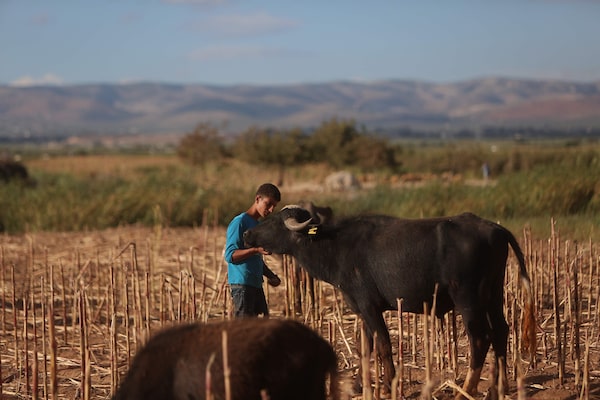If you’re reading this on the web or someone forwarded this e-mail newsletter to you, you can sign up for Globe Climate and all Globe newsletters here.
Good afternoon, and welcome to Globe Climate, a newsletter about climate change, environment and resources in Canada.
This weekend Atlantic Canadians suffered one of the most devastating post-tropical storms ever to hit the region. On Sunday, people emerged to asses the destruction left behind by Hurricane Fiona.
Fiona turned the barely imaginable into the all-too possible, writes science reporter Ivan Semeniuk. Lurking in the background of events this weekend, is whether the storm is a once-in-a-lifetime fluke or a sign of more to come. Read what he learned about the future of storms.
Yes, climate change is part of what makes these type of storms even worse. For now, the East Coast begins its long road to recovery.
Now, let’s catch you up on other news.
Hurricane Fiona makes landfall between Canso and Guysborough, Nova Scotia, Canada in a composite image from the National Oceanic and Atmospheric Administration (NOAA) GOES-East weather satellite September 24, 2022.NOAA/Reuters
Noteworthy reporting this week:
- Oil and Gas: Canada’s oil sands are making billions – and very little of it is going to net-zero commitments. In Alberta, the Energy Disruptors conference returned as the industry attempts to reinvent itself in response to pressure to address climate change. Also, Indigenous-led Cedar LNG seeks regulatory approval under new climate rules
- Nature: Indigenous conservation is key to protecting wilderness in Canada, report says
- Energy: A green hydrogen future needs more investment in production capacity. Also, Ottawa looks to push provinces to modernize electricity grids
- Wildfire: B.C. residents in fire-prone areas encouraged to keep valuables at the ready should they have to flee
- Environmental justice: In Mississippi, Jackson’s water crisis points to racial, class and partisan divides – and the coming climate disasters might make them worse
- From The Narwhal: The Mamalilikulla’s long journey home and the groundswell of Indigenous nations declaring protected areas based on their own sovereignty
A deeper dive
Taking a conservation-minded approach to fishing
Jenn Thornhill Verma is a freelance reporter and member of the Oxford Climate Journalism Network. For this week’s deeper dive, she talks about getting women and girls back out in the fishing boat.
Before 25-year-old Pratyusha Akunuri joined Girls Who Fish, she had never stepped into a fishing boat, much less go fishing. The Memorial University graduate student from Brampton, Ont., says getting out in boat has brought her food security studies to life.
A key question for Akunuri is why Newfoundlanders and Labradorians, who boast a plentiful supply of fresh seafood steps away from their front porch, often buy imported, frozen, and packaged seafood from big-box retailers. In part, she says what prevents locals from catching their own fish is is not having the means—no boat, no gear and no one to pass traditional fishing practices down the family line. Add to that, says Girls Who Fish co-founder, Kimberly Orren, many community wharves — once the focal point of coastal fishing towns, drawing the whole community when fishers land catch — are unwelcoming, heavily industrialized spaces.
Nestled in Petty Harbour-Maddox Cove, a fishing community on the eastern shores of Newfoundland, south of St. John’s, Girls Who Fish is about getting women and girls back to the fishing wharf. Twenty-six-year-old Rachel Morrison, says a big draw was learning a conservation-minded fishing method.
“The traditional handline fishery is promoting sustainability and conservation. It’s not doing things to destroy or harm our ecosystem. With a hook and a line, you’re able to feed yourself, your community, and your family,” says Morrison, a Memorial University marine biology graduate student from Guelph, Ont.
If we want fishing to be sustainable, then we need to take good care of the fish for the fish to be able to take good care of us, says Dr. Rashid Sumaila, a Canada Research Chair in Interdisciplinary Ocean and Fisheries Economics at the University of British Columbia. With climate change and ocean warming threatening many marine species, a gentler approach to fishing (using handlines versus gillnets, for example) is especially crucial, says Orren.
If we’re going to tackle climate change, conservation issues and gender equity, then we need women and girls in the boat, says Orren.
“Many of the young women and girls who participate, it’s the first time they’ve gone fishing, and for some, that moment is a mark in their lives,” says Orren, adding it’s the big changes that happen one person at a time.
- Jenn
Pratyusha Akunuri sits aboard as the boat heads out to catch cod fishKARA O`KEEFE/The Globe and Mail
What else you missed
- Legault put on defensive over cost of living, environment in final Quebec election debate
- Cheetahs return to India after disappearing from the country 70 years ago
- Climate change effect on public transportation infrastructure to cost billions: FAO
- Norway’s wealth fund tells firms to set net-zero emission goals by 2050
- Global protests demand climate change compensation ahead of COP27
- Michael Bloomberg launches $85-million campaign to block construction of plastic, petrochemical plants in U.S.
- Two-thirds of U.S. Senate votes to amend global environmental treaty
- Tonga volcano blast was unusual, could even warm the Earth
Opinion and analysis
Gary Mason: Why doesn’t Pierre Poilievre seem to care about climate change?
Ken Coates: The great Saskatchewan River Delta is a good place to start resetting our ecological compass
Green Investing
Alberta’s carbon-capture entrepreneurs want more certainty amid efforts to ease global energy crisis
Craig Golinowski is president of a Calgary-based private equity firm that rebranded itself a year and a half ago from a backer exclusively of small- and mid-sized oil companies to an outfit seeking to fund carbon capture and storage projects. But the plan to offer his investors a piece of the energy transition has hit snags.
“We have been working on trying to build an emerging industry. It’s sort of evangelical or missionary work. I’m not sure I would do it again if I knew, but I do believe this fundamentally is the right thing to do,” Mr. Golinowski said in an interview.
Also read: This week we wrote about two Canadian banks that are taking on more climate action. Royal Bank of Canada has merged its technology banking unit with its Ventures business that nurtures companies outside traditional banking as it looks to expand support for a tech sector squeezed by a slowing economy. Toronto-Dominion Bank has launched a carbon advisory business and is investing $10-million in a major Ontario forest conservation project.
- World Bank president David Malpass tries to restate views on climate change amid calls for dismissal
- U.S. banks threaten to leave Mark Carney’s green alliance over legal risks
- EU’s green shift depends on mammoth investment in energy grid, draft document shows
Making waves
Each week The Globe will profile a Canadian making a difference. This week we’re highlighting the work of Varun Virlan doing intersectional activism.

Varun VirlanSupplied
Hi, I’m Varun Virlan, 26, and I live in Toronto. I’m passionate about the intersection of climate, animal and racial justice. I strongly believe that in order to tackle any one of those issues, we must address them all.
As well as street activism, I co-ordinate digital media for Plant Based Treaty. We are creating bottom-up pressure on national governments to negotiate a global agreement to dismantle animal agriculture and transition to a plant-based food system in response to the climate emergency.
Raising and killing animals is killing us, literally. It’s a leading cause of methane, deforestation, species extinction, biodiversity loss and ocean dead zones. If we ended fossil fuels today, temperatures would still rise above 1.5 C warming. Adopting a vegan diet could help reduce our impact on Earth. Please consider signing the Plant Based Treaty www.PlantBasedTreaty.org and e-mail your councillors asking them to endorse the treaty as well.
- Varun
Do you know an engaged individual? Someone who represents the real engines pursuing change in the country? Email us at GlobeClimate@globeandmail.com to tell us about them.
Photo of the week

A young man caresses a water buffalo, near the village of Deir Ballut in the Afrin region of Syria's rebel-held northern Aleppo province, on September 24, 2022.AAREF WATAD/AFP/Getty Images
Guides and Explainers
- Want to learn to invest sustainably? We have a class for that: Green Investing 101 newsletter course for the climate-conscious investor. Not sure you need help? Take our quiz to challenge your knowledge.
- We've rounded up our reporters' content to help you learn about what a carbon tax is, what happened at COP 26, and just generally how Canada will change because of climate change.
- We have ways to make your travelling more sustainable and if you like to read, here are books to help the environmentalist in you grow, as well as a downloadable e-book of Micro Skills - Little Steps to Big Change.
Catch up on Globe Climate
- Is Canada’s largest farmland owner an optimist or pessimist?
- As temperatures rise, so does risk to athlete health
- Mercury in the Arctic puts Indigenous communities, wildlife at risk
- Climate change is making it harder for you to sleep
We want to hear from you. Email us: GlobeClimate@globeandmail.com. Do you know someone who needs this newsletter? Send them to our Newsletters page.